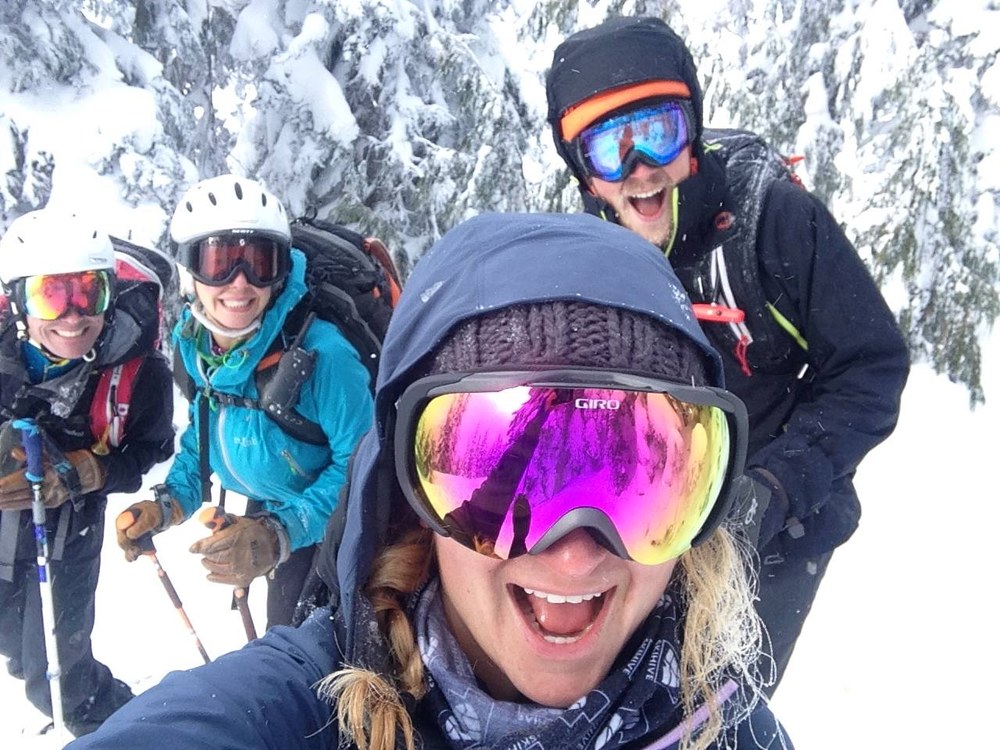
Experienced adventuristas often forget what it was like to be 'the noob'. We have our kit dialed, know how much food to pack, and can go from no plans to leaving on a two-day ski trip in 30-minutes without breaking a sweat. But we were all beginners once, and each have someone to thank for taking us out for our first hike, bike, ski, or climb.
Whether you're new to the outdoors or a grizzled mountain-woman, follow these guidelines to be a good adventure buddy for your partner(s):
Be honest about your prior experience
A few years ago I put together a "newbie day" for a few of my new-to-backcountry friends. One of the trip members told me he "had a few days in the backcountry", which translated to "I've skied in the side-country once and have to rent a splitboard to go out with you". His lack of experience wasn't a problem - this was a newbies day after all - but by exaggerating his experience level he put me and the other party members at risk. Had I known his real ability I simply would have picked a different objective. But I didn't know, I didn't pick a different objective, and he didn't have a good day. Bummer all around.
Ask questions before the trip
Debating between a puffy or a fleece? Need to borrow crampons? Not sure if you need to bring water? No problem. Let your partners know. I have answers and probably have extras. Don't buy stuff you don't need when you can easily borrow, and don't NOT bring something because you were too afraid to ask. Playing outside is serious business. When you venture into the unknown, you enter an unpredictable world of potential hazard: twisted ankles, sudden snowstorms, lost gear, a car towed from the trailhead.... Unexpected things happen all the time - it's part of the appeal. Take time to put a good plan in place. It'll make your experience better in the long run.
Pack enough stuff
If you stayed at home for a day, you would need to get dressed, eat, and presumably use items to do things. The same goes for the backcountry. You need to clothe yourself, feed yourself, and use items to do things. I tend to have a standard packing list, with a few add-ons depending on the objective. Make a list of what you'll need, lay it out on the floor, and double-check your list as you stuff it into your bag.
But not too much
The heavier your pack, the slower you will be. Being slow means you are hiking for longer, and can potentially fall short of your objective due to turnaround times. I looked for some science to back me up on the weight to hiking speed ratio, but I was overwhelmed by math so you'll just have to take my word for it: it makes you slower. Bring only what you need within a comfortable margin of safety. That said, I normally bring one more layer than I think I'll need. Mountains are unpredictable. Safety is imperative.
Speak up when something is troubling you
If you aren't comfortable, you won't have a good time. Being outside is about Type I Fun (most of the time), so embrace the experience and use your voice to advocate for yourself. If the conditions are sketching you out that's an immediate cause for concern. Tell your partners. They'll talk through it with you, and make a decision that's best for the group. If you just need a break - to address a growing blister, adjust your backpack carry, feed your face - by all means ask for it. No team should have to turn around because someone let an annoyance fester to the point of catastrophe.
Feed yourself
Each individual is their own delicate snowflake with unique metabolic needs. Some of us need to eat a lot. Some of us do not. If you don't know where you fall on the 'hangry spectrum', bring more food than you think you'll need. Then feed yourself. A LOT. You should be sticking something in your face at least once an hour or you'll risk bonking (which is bad). Bring a mix of things: simple carbs (for immediate energy), and more long-lasting foods like mixed nuts. If you continually find yourself hungry on the trail - eat more! It's an easy fix.
Remember you are responsible for your own good time
I used to be a very negative person. I liked to complain, and I really liked it when I could influence others to complain with me. I bonded through negativity. Long story short: it was not a good way to ingratiate myself into the company of new people. I adopted a new outlook, and I embraced being responsible for my own good time. If you do need to complain every now and then, that's fine, but try to complain with a solution in mind. No one likes a Negative Nelly, but a Negative Nelly in a onesie suggesting beer floats at the end of the grueling day - well, everyone wants to hang out with that guy.
 Kristina Ciari Tursi
Kristina Ciari Tursi